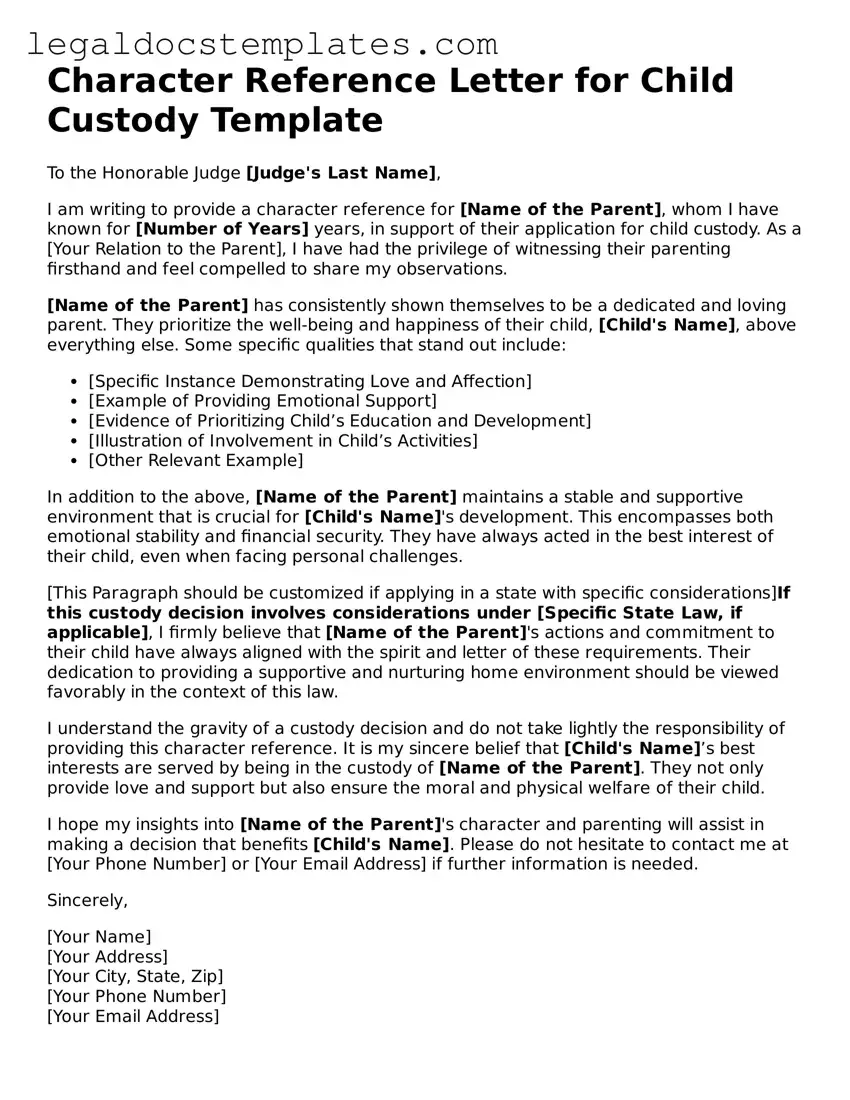A Character Reference Letter for Child Custody bears similarities to a Letter of Recommendation for Employment. Both serve the purpose of advocating for an individual's character and capabilities. In a custody case, the letter supports the parent's ability to provide a stable and nurturing environment for the child, similar to how a letter of recommendation speaks to a candidate's qualifications and character for a job position. However, the focus on parenting skills and the child's welfare sets it apart from the employment context.
Similar in nature to the Affidavit of Character, the Character Reference Letter for Child Custody presents personal insights and endorsements of an individual's moral standing. While the Character Reference Letter offers a more informal and personal touch, the Affidavit of Character is structured as a legal document, sworn before a notary, providing an official statement on the individual’s character, often used in court proceedings beyond the realm of custody battles.
Guardianship Letters share a close resemblance, as they both address the wellbeing and care of a child. However, the Character Reference Letter for Child Custody is crafted by a third party to support a parent's custody claim, whereas a Guardianship Letter is typically written by the parents or guardians themselves, outlining arrangements for the child's future care in the event of the parents' inability to continue as primary caregivers.
The Letter of Intent for Custody, while serving a similar purpose to support a custody claim, is directly penned by the parent. It outlines the parent’s desires and plans for the child’s upbringing, contrasting with the Character Reference Letter, which is an endorsement from an external source testifying to the parent's character and parenting abilities.
Personal statements in college applications share a common goal with Custody Character Reference Letters—both aim to present the individual in the best light possible to the decision-makers. In custody cases, the individual’s capacity as a responsible and loving parent is highlighted, while in college applications, the student's achievements, character, and potential are brought to the forefront.
Professional Reference Letters, typically used in the workplace, and Character Reference Letters for Child Custody, both function to provide a third-party perspective on an individual’s qualities. The distinction lies in the context; professional references focus on work ethic, skills, and professional achievements, whereas custody reference letters emphasize personal character and parental abilities.
Adoption Reference Letters are akin to Character Reference Letters for Child Custody, as both involve the care of a child and assess the suitability of the home environment. Adoption references are written to support the potential adoptive parents in the adoption process, focusing on their parenting capabilities, similar to how custody letters support a parent’s claim to maintain or obtain custody.
Petition for Character Certificate Letters, used in various legal and social contexts to establish an individual’s good reputation and behavior, also parallel the Character Reference Letter for Child Custody. Although the Character Certificate often serves broader purposes, such as employment or legal compliance, both types of letters vouch for the individual's moral standing and integrity.

